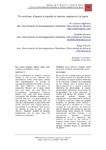The evolution of gender inequality in tourism employment in Spain

View/
Use this link to cite
http://hdl.handle.net/2183/12637Collections
Metadata
Show full item recordTitle
The evolution of gender inequality in tourism employment in SpainDate
2013Citation
ROTUR Revista de ocio y turismo, 2013, 6: 182-200. ISSN: 1888-6884
Abstract
[Abstract] While investment in women's human capital in the tourist industry has increased in recent years and it seems that discrimination in access to managerial positions has fallen, we can still find different situations of inequality. Women get a wage below men and there are new forms of occupational segregation between women and men and even women themselves: the division between part-and full-time jobs is a good example of this process. The hypothesis here is that this combination of paid work time (public domain) and unpaid (private, household) is an obstacle that causes the access of men to jobs so far, "female", likewise, quality of tourism employment will be seen from the perspective of gender. [Resumen] Evolución de la desigualdad por género del empleo turístico en España. Si bien la inversión en capital laboral femenino en la industria turística ha aumentado en los últimos años y parece que la discriminación en el acceso a puestos directivos ha descendido, se siguen produciendo diferentes situaciones de desigualdad. La mujer mantiene un salario por debajo del hombre y han aparecido nuevas formas de segregación ocupacional entre hombres y mujeres e incluso entre las propias mujeres: la división entre trabajo a tiempo parcial y completo es un buen ejemplo de este proceso. La hipótesis que se plantea este trabajo es que esa combinación entre tiempo de trabajo remunerado (ámbito público) y no remunerado (ámbito privado, doméstico) es un obstáculo que provoca el acceso de los varones a empleos hasta ahora “femeninos”; así mismo, se observará la calidad del empleo turístico desde la perspectiva de género.
Keywords
Género
Trabajo
Techo de cristal
Turismo
Conciliación
Crisis
Gender
Labour
Glass roof
Tourism
Conciliation
Crisis
Trabajo
Techo de cristal
Turismo
Conciliación
Crisis
Gender
Labour
Glass roof
Tourism
Conciliation
Crisis
ISSN
1888-6884





